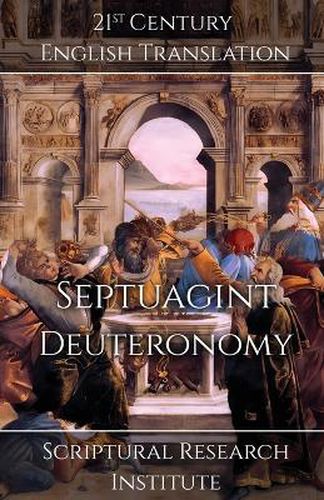Readings Newsletter
Become a Readings Member to make your shopping experience even easier.
Sign in or sign up for free!
You’re not far away from qualifying for FREE standard shipping within Australia
You’ve qualified for FREE standard shipping within Australia
The cart is loading…






This title is printed to order. This book may have been self-published. If so, we cannot guarantee the quality of the content. In the main most books will have gone through the editing process however some may not. We therefore suggest that you be aware of this before ordering this book. If in doubt check either the author or publisher’s details as we are unable to accept any returns unless they are faulty. Please contact us if you have any questions.
In the mid 3rd century BC, King Ptolemy II Philadelphus of Egypt ordered a translation of the ancient Israelite scriptures for the Library of Alexandria, which resulted in the creation of the Septuagint. The original version, published circa 250 BC, only included the Torah, or in Greek terms, the Pentateuch. The Torah is the five books traditionally credited to Moses, circa 1500 BC: Cosmic Genesis, Exodus, Leviticus, Numbers, and Deuteronomy.The Greek terms in Deuteronomy are translations of known Canaanite gods, most especially, El, the Canaanite creator god. El translates in Canaanite and Hebrew as 'God, ' and is the primary god worshiped in ancient Canaan in the era Abraham was reported to have passed through the area. El was also the patron god of the Temple of El, built by Jacob near the modern city of Nablus in the Palestinian West Bank, which featured in many of the early Israelite scriptures before Samaria was conquered by the Assyrian Empire.In the Book of Micah, the Temple of El was referred to as Jacob's Temple of El, which confirms that the Israelites in the 8?? century BC considered the Temple of El at Shiloh to be the Temple of El that Jacob built, in Cosmic Genesis chapter 35. If the Greeks translated the Septuagint accurately, which everything other than the names of God indicates, then the term God would have been El in the texts they translated. Likewise, Lord God would have been Adon Elohim, the title of El, which translates as 'Father of the gods.' Adon Elohim was a Canaanite title for El, found in the Ugaritic Texts.This translation attempts to restore and translate the original Septuagint's book of Deuteronomy as it would have appeared circa 250 BC.
$9.00 standard shipping within Australia
FREE standard shipping within Australia for orders over $100.00
Express & International shipping calculated at checkout
This title is printed to order. This book may have been self-published. If so, we cannot guarantee the quality of the content. In the main most books will have gone through the editing process however some may not. We therefore suggest that you be aware of this before ordering this book. If in doubt check either the author or publisher’s details as we are unable to accept any returns unless they are faulty. Please contact us if you have any questions.
In the mid 3rd century BC, King Ptolemy II Philadelphus of Egypt ordered a translation of the ancient Israelite scriptures for the Library of Alexandria, which resulted in the creation of the Septuagint. The original version, published circa 250 BC, only included the Torah, or in Greek terms, the Pentateuch. The Torah is the five books traditionally credited to Moses, circa 1500 BC: Cosmic Genesis, Exodus, Leviticus, Numbers, and Deuteronomy.The Greek terms in Deuteronomy are translations of known Canaanite gods, most especially, El, the Canaanite creator god. El translates in Canaanite and Hebrew as 'God, ' and is the primary god worshiped in ancient Canaan in the era Abraham was reported to have passed through the area. El was also the patron god of the Temple of El, built by Jacob near the modern city of Nablus in the Palestinian West Bank, which featured in many of the early Israelite scriptures before Samaria was conquered by the Assyrian Empire.In the Book of Micah, the Temple of El was referred to as Jacob's Temple of El, which confirms that the Israelites in the 8?? century BC considered the Temple of El at Shiloh to be the Temple of El that Jacob built, in Cosmic Genesis chapter 35. If the Greeks translated the Septuagint accurately, which everything other than the names of God indicates, then the term God would have been El in the texts they translated. Likewise, Lord God would have been Adon Elohim, the title of El, which translates as 'Father of the gods.' Adon Elohim was a Canaanite title for El, found in the Ugaritic Texts.This translation attempts to restore and translate the original Septuagint's book of Deuteronomy as it would have appeared circa 250 BC.